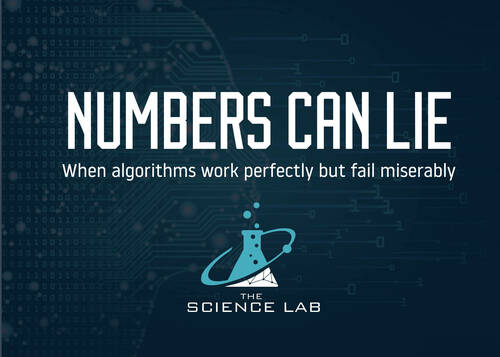
The famous saying “numbers don’t lie” might work when reporting the score of a football game, but even then, the numbers don’t tell the whole story.
Algorithms developed by data scientists have implications for not only who may obtain a fair loan, but who stays in prison and who’s released, and who will be favored by machine learning “decisions.” With so many parts of our lives decided by Big Data, how do scientists balance the algorithms and the ethics?
The University of Notre Dame College of Science and Notre Dame Alumni Association's ThinkND, along with partners from across the University, are launching The Science Lab, an open, multimedia educational enrichment program featuring Notre Dame’s world-class science researchers and other scientific leaders. The first in the series, "Numbers Can Lie: When algorithms work perfectly but fail miserably," will be held at noon Eastern time on three Fridays: Oct. 9, Oct. 23 and Nov. 6. Registration is open.
The program is led by Roger Woodard, the director of Notre Dame’s Online Master’s in Data Science program. In the three sessions of this program, listeners will learn the basics behind data science and discover how easily human bias can be encoded into computer models.
“This program is important to me because Notre Dame has a long tradition of fighting for the social good. That is why we focus not only on the rigorous technical side of data science, but also on the ethical side,” Woodard said. “Data science algorithms can streamline business processes, improve medical treatment and help us find the products we want.”
Many people assume that algorithms produce irrefutable facts and unbiased opinions, he noted. “But when it comes to data science we need to realize that algorithms can work perfectly from a technical point of view, but have a negative impact on the people around us. In this program we are going to explore how that can happen.”
Numbers Can Lie includes short explainer videos; a book selection, “Weapons of Math Destruction,” by Cathy O’Neil, who will speak at the third meeting; and interactive, one-hour Zoom sessions. The program is free and open to all, and is hosted exclusively on ThinkND, Notre Dame’s open, online learning community.
Other programs in The Science Lab will launch beginning early 2021.
“The process of doing science at Notre Dame has always been about building knowledge to impact society in positive ways,” said Mary Galvin, the William K. Warren Foundation Dean of the College of Science. “Perhaps now more than ever, performing scientific research is crucial to advancing society in ways that will help the most people in the best ways possible.”
The Alumni Association’s ThinkND synchronous learning series include several different areas of research and topics, and have become an essential part of connecting with the University and learning from home.
"As science and data continue to grow in prevalence and importance in our society, we are excited to work with our campus partners to bring The Science Lab to the Notre Dame family," said Dolly Duffy, executive director of the Alumni Association. "The partnership between ThinkND and the Notre Dame academic community continues to grow and provide outstanding learning opportunities for our alumni, parents and friends."
Originally published by at science.nd.edu on Sept. 21.